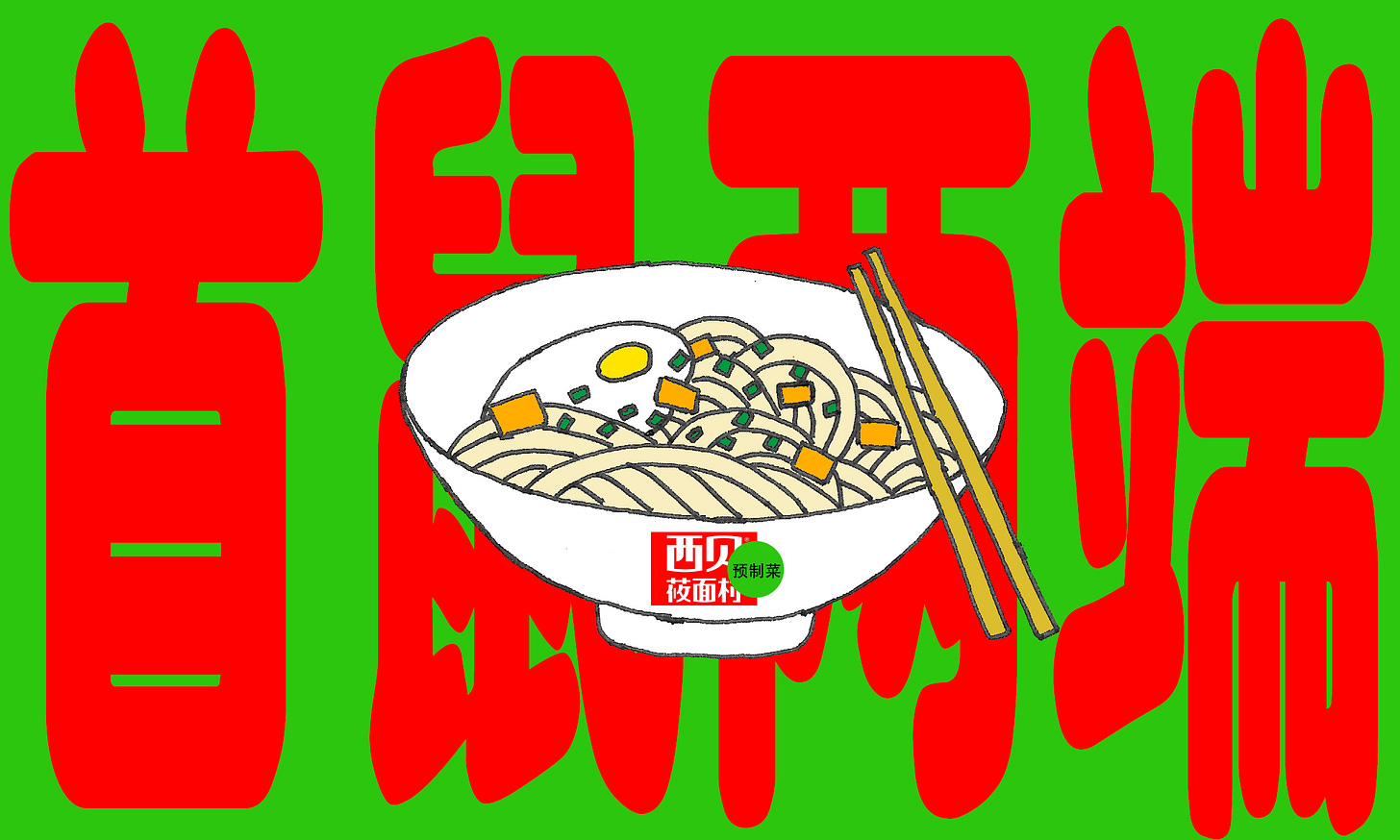Welcome to RealTime Mandarin, a free weekly newsletter that helps you improve your Mandarin in 10 minutes a week.
Subscribe today to get your fluency back, stay informed about China, and communicate with confidence in Chinese — all through immersion in real news.
Popular restaurant chain Xibei (西贝) has been at the centre of a social media storm over the last week.
Xibei is a prominent restaurant chain specialising in northwestern Chinese cuisine. As a premium casual dining brand, it charges higher prices for what it markets as high-quality, authentic dishes.
But Xibei's premium positioning came under fire this week.
It started on September 10th, when entrepreneur and social media influencer Luo Yonghao (罗永浩) shared a short post on Weibo to his 1.4 million followers:
"I haven't eaten at Xibei for ages. Today after getting off the plane, I had a meal there with colleagues and discovered almost everything was pre-made, and it's so expensive too.
It was really disgusting.
I hope restaurants will soon be legally required to clearly indicate whether they use pre-made food or not."
好久没吃西贝了,今天下飞机跟同事吃了一顿,发现几乎全都是预制菜,还那么贵,实在是太恶心了。希望国家尽早推动立法,强制饭馆注明是否用了预制菜。
Xibei founder Jia Guolong (贾国龙) quickly hit back:
"The food we make is of decent quality.
Of the 13 dishes he ordered, not a single one was made from ready meals. The allegation is damaging to our reputation."
"我们做的饭中规中矩,他点的13道菜里也没有一道是预制菜。这有点砸牌子了。"
He went on to say that Xibei uses a central kitchen model, which he argued is not the same as pre-made food. He also threatened to take legal action against Luo Yonghao.
Luo escalated, offering a 100,000 yuan reward for evidence that Xibei's dishes were pre-made. He also live-streamed Xibei food packaging showing additives, and an 18-month shelf life.
Under mounting pressure, the Xibei founder made a surprising move.
He launched the Xibei "Luo Yonghao Set Meal" (罗永浩套餐) — the exact menu Luo had criticised just days before. Jia Guolong also invited customers to inspect the kitchens where the food had been prepared, just to prove it was made fresh on site.
The clever marketing tactic started to reduce the temperature. Eventually Xibei issued an apology:
"We're committed to real change based on your feedback."
虚心接受,坚决整改!
And Luo also began to tone his rhetoric down.
Related
The dispute reflects two deeper problems in China's food industry.
First, "pre-made food" (预制菜) has no clear regulatory definition. Second, restaurants face mounting pressure from price-conscious customers who are actively “downgrading consumption” (消费降级).
The lack of official definition means "pre-made" has a different meanings to different groups of people.
For consumers, a "pre-made" dish is anything that doesn't taste fresh, isn't piping hot, and lacks that "just-cooked" aroma — known as "wok hei" (锅气) in Chinese.
But for restaurant chains in crowded city districts with fast turnover and limited space, part-preparing dishes off-site in "central kitchens" (中央厨房) isn't really "pre-made" — it's operational necessity.
Xibei uses this central kitchen model, where ingredients are pre-processed (washed, cut, partially cooked), delivered to stores 3-5 times weekly, then refrigerated or frozen until customer orders arrive.
This keeps costs down while maintaining what chains consider acceptable freshness and quality. And as his comments suggest, Jia Guolong sees this as efficient operations, not "pre-made."
On to the second problem: Xibei’s high prices.
Despite efforts to cut average spending per customer from 120 yuan to around 80 yuan since 2023, consumers still say “Xibei is expensive" (西贝贵).
So the restaurant chain faces a pricing paradox.
It’s trying to cut costs while marketing itself on freshness to justify premium pricing, as one analyst notes:
"Xibei finds itself caught in a dilemma: it craves the efficiency and profits brought by industrialization, yet clings to the narrative and premium pricing of 'freshly made, freshly cooked.'
But in today's era of radical transparency, its attempt to have it both ways looks increasingly untenable."
西贝的困境在于:它既想要工业化带来的效率和利润,又想要"现做现炒"的故事和溢价。在信息越发透明的今天,这种"首鼠两端"的策略注定难以维系!
This tension echoes disputes we've discussed previously in RealTime Mandarin:
The Florasis 79 yuan eyebrow pencil that sparked the "how is this expensive?!" (哪李贵了) controversy
And the condemnation of luxury ice cream brand, Chicecream (钟薛高), as an "ice cream assassin" (雪糕刺客)
All three share a common thread: Chinese consumers are increasingly price-sensitive and demand clear value for money.
For premium brands like Xibei, this means they must work harder to justify their high prices, as one industry observer put it:
"The real problem isn't that they're expensive — it's that they can't explain why they're expensive."
贵不是问题,说不清为什么贵才是问题。
So that’s what we’re exploring this week!
Favourite Five
1. 刺客 cì kè
assassin, hidden rip-off
直到网友一句:“二两宜宾燃面要卖你67元!”What!我一下就共情了,刺客! - When a netizen said, “You need to pay 67 yuan for a bowl of Yibin noodles!” What! I could instantly feel him — what a rip-off! [3]
2. 砸牌子 zá pái zi
tarnish the reputation, damage the brand
这是他所不能接受的,“有点砸牌子了” - This is something he cannot accept, because “it kind of damages the brand’s reputation.” [1]
3. 冤大头 yuān dà tóu
sucker, easy mark
人均一百多吃个加热包,感觉像冤大头 - Spending over a hundred per person on a reheated ready meal makes me feel like a sucker. [4]
Related:
冤案 yuān’àn – wrongful case
冤枉 yuān wang – to wrong, unjust
4. 首鼠两端 shǒu shǔ liǎng duān
hesitant, vacillating
在信息越发透明的今天,这种“首鼠两端”的策略注定难以维系 - In today's era of radical transparency, its attempt to have it both ways looks increasingly untenable. [2]
5. 纸包不住火 zhǐ bāo bú zhù huǒ
the truth cannot be hidden forever
然而纸里终究包不住火,消费者也是在不断进化的,一旦碰到罗永浩这样的批评者揭开真相(或许是局部的),引燃“火药桶”,西贝再想“灭火”,只会付出更大的代价 - However, the truth will eventually come out. Consumer habits are constantly evolving, and once critics like Luo Yonghao expose the truth (even partially), it ignites a powder keg, and any attempt by Xibei to “put out the fire” will only come at a greater cost. [2]
🗣️ Missing Your Mandarin Speaking Mojo?
There’s still time to join the next RTM Speaking Sprint which starts in October.
It will help you rapidly get your speaking confidence back.
Find out more about RTM Speaking Sprints here.
Ready to hop aboard?
Consuming the Conversation
Useful words
6. 对线 duì xiàn
confront, go head-to-head
身处和罗永浩“对线”风口浪尖的西贝,终于发了最新道歉声明 - Caught in the dispute with Luo Yonghao, Xibei finally issued its apology in the latest development. [2]
7. 心智 xīn zhì
mentality, (consumer) perception
西贝在儿童餐方面起步较早,所以消费者心智相对较强 - Xibei started relatively early in children’s meals, so consumers are relatively loyal to the brand. [1]
8. 悬赏 xuán shǎng
offer a reward, bounty
就在西贝宣布要起诉后,罗永浩表示悬赏10万元,公开向外界征集能证明西贝使用预制菜的“真实证据” - Right after Xibei announced it would sue Luo Yonghao, Luo offered a 100,000 yuan bounty, openly asking the public to provide “real evidence” to prove that Xibei used pre-made dishes. [1]
9. 拱火 gǒng huǒ
fan the flames, stir things up
西贝和罗永浩对线的“战火”越烧越旺——这次“拱火”的,竟然是西贝一方! - The battle between Xibei and Luo Yonghao grew fiercer — and this time, the one fanning the flames was actually Xibei itself! [2]

















